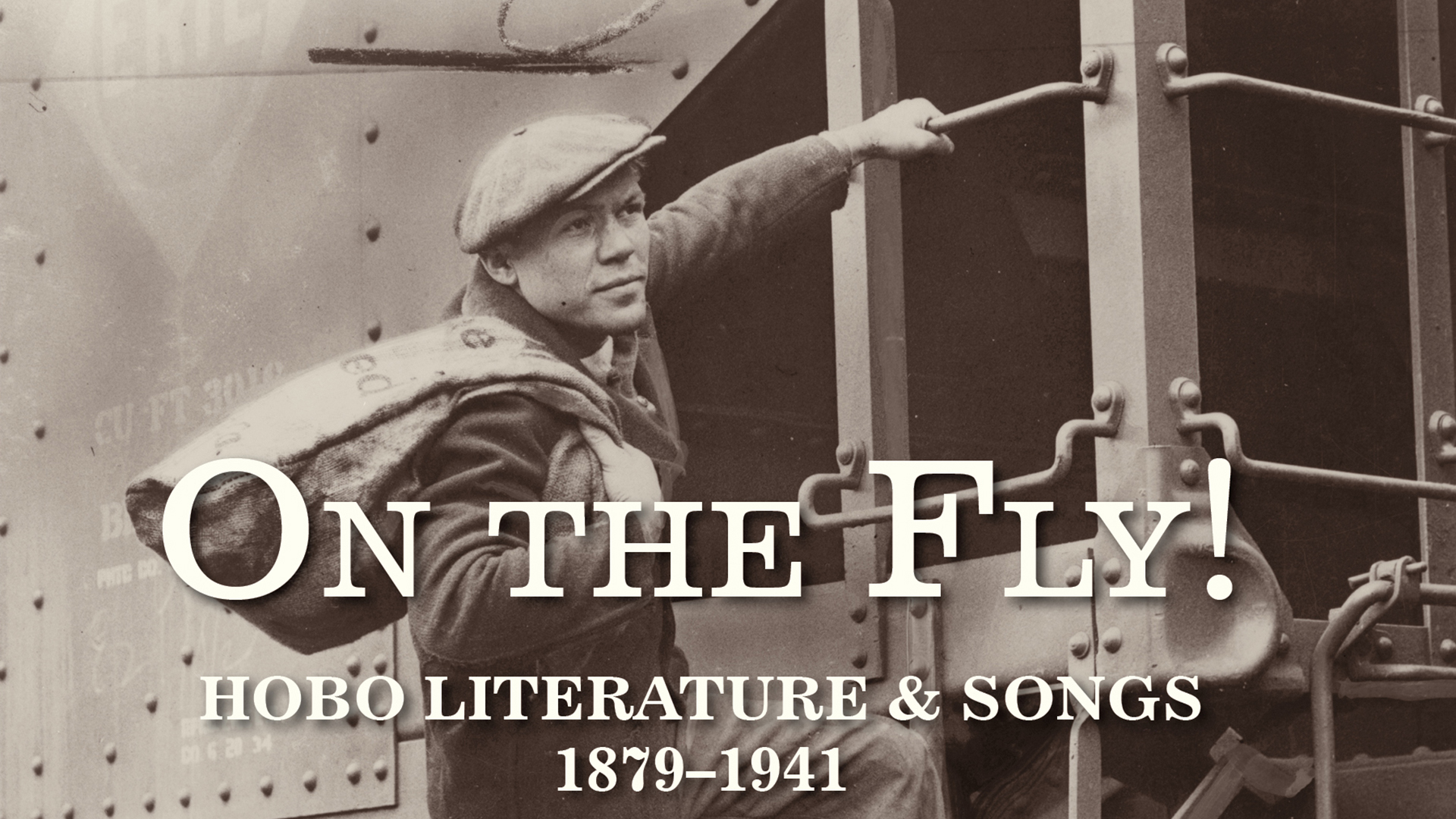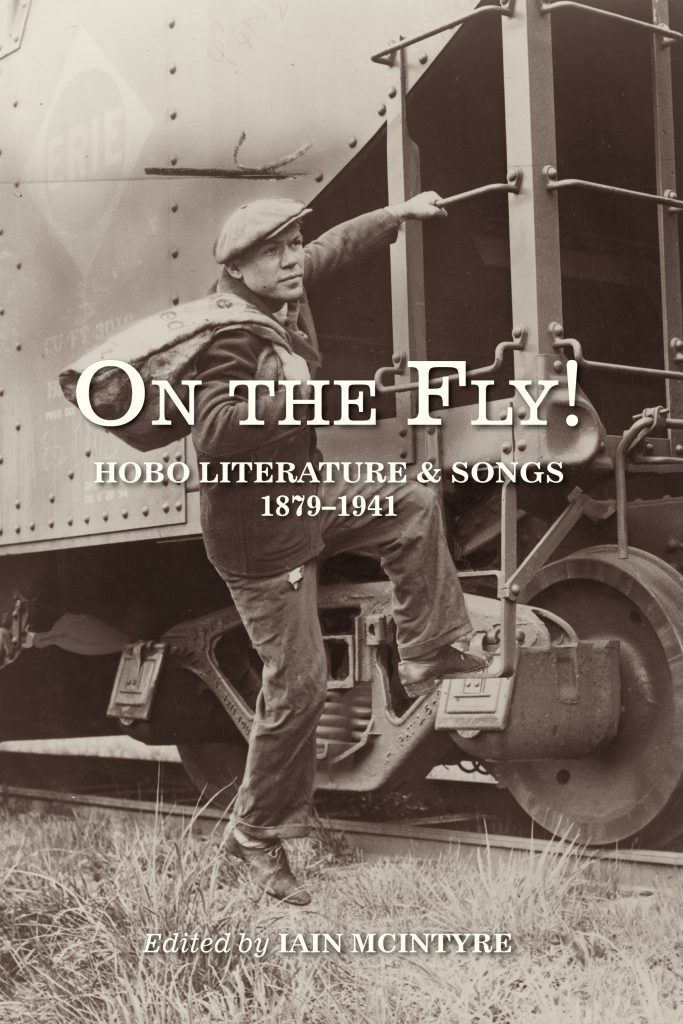By Rowan Cahill
Labour History Melbourne
An overview of the work of Iain McIntyre, and a review of his anthology, On the Fly! Hobo Literature and Songs, 1879-1941.
Melbourne-based left activist Iain McIntyre is many things, most recently a doctoral graduate with a thesis, and potential book, dealing with environmental direct action between 1979 and 1990 in Australia, Canada and the US. Which also adds membership of the academic precariat to his CV. Over the decades since the 1980s, McIntyre has variously worked, written, published, edited, and engaged in the hard yakka of face-to-face front line activism. He has also been a zine enthusiast, with a string of titles to his credit; musician, with a string of gigs and recordings behind him; community radio broadcaster; curator; historian; pamphleteer. Maybe my use of ‘been’ here is amiss, since at any time McIntrye can be/is, anyone of these, or combination thereof.
Amongst McIntyre’s publications are books with a transnational focus that establish his credentials as a specialist in subcultures, their modes of organisation and conduct, and their cultures: Wild About You!: The Sixties Beat Explosion in Australia and New Zealand (co-edited with Ian D Marks, 2010); Girl Gangs, Biker Boys, and Real Cool Cats: Pulp Fiction and Youth Culture, 1950 to 1980 (co-edited with Andrew Nette, 2017), this with a Foreword by the Australian academic, musician, crime novelist Peter Doyle – as an aside, one of the best descriptions of the late-1960s Australian anti-war movement is found in Doyle’s crime novel The Big Whatever (2015), part of his Billy Glasheen series; Sticking it to the Man: Revolution and Counterculture in Pulp and Popular Fiction, 1950-1980 (co-edited with Andrew Nette, 2019).

Earlier than these, with an Australian focus, and my favourite, is How to Make Trouble and Influence People: Pranks, Protests, Graffiti & Political Mischief-Making from across Australia. It has variously appeared in three editions since 1996 and is a profusely illustrated collection of some 500 anecdotes, stories, snippets, interviews, stories, about creative resistance in Australia from colonial times to the present – blockades, graffiti, rebellions, banner drops, street theatre, revolts and so on. It is mix of coffee table tome and smorgasbord catalogue of ‘how to rebel’ informed by the premise ‘it is right to rebel’, cheekily patched together with humour. It is a book designed to be browsed, sampled, dipped into, enjoyed. The use of ‘mischief’ in the title is carefully chosen, to convey trouble and a cheeky disregard for orthodoxy and authority. All too often radical political tomes, as this is, are deadly serious. McIntyre’s book however brings humour to the fore, an often overlooked and effective political dimension and weapon. When I pick up Mischief-Making the words of novelist Rafael Sabatini, about his lawyer/actor hero Scaramouche in the 1921 novel of that name set in the French Revolution, come to mind: ‘He was born with a gift of laughter and a sense that the world was mad’.
Entering McIntyre’s literary world I am reminded of the strange and wonderful novel by Umberto Eco, The Mysterious Flame of Queen Loana (2005). In this Eco explored the ways in which popular culture, magazines, comics, pulp novels, and the like, what is traditionally regarded as ephemera, are significant historical markers, cultural expressions of their times, and the powerful and subtle ways they can operate as personal building blocks, contributors to the formation and making of human identities and understandings of the world, even in minds regarded as being sophisticated.

Which brings me to On the Fly! Hobo Literature & Songs: 1879-1941 (2018) edited by McIntyre. This is an anthology of songs, poems, stories, reportage from the world of Hobohemia, a world of dispossession, homelessness, marginality that became an iconic feature of American life between the 1870s and 1940s, as millions of men, women and children, generically referred to as Hoboes, crisscrossed the United States for various economic, personal and political reasons, illegally using the freight rail system to do so. The hobo colloquialism ‘on the fly’ refers to the act of boarding a moving train.
This was a world that developed its own codes of ethics and morality; its own vocabulary, culture, and social divisions; and where, on the margins of respectable society, out of police reach, near fresh water and close to where trains could be illegally boarded, substantial hobo communities, known as ‘Jungles’, developed. As this anthology demonstrates, this was a creative world, its literary manifestations carried in a range of ephemera few have bothered to substantially collect, hence what McIntyre describes as ‘the years’ it took for him track the material down in archives and libraries in the US and the UK.
There have been academic studies of the hobo world, but McIntyre’s book is the first anthology, all up some eighty pieces. Coming as it does with a significant scholarly Introduction by McIntyre, it is, as the distinguished American radical historian Paul Buhle has commented, ‘a brilliant introduction to the subject’. Some of the authors collected by McIntyre are well known, people like Jack London, W.H. Davies, Jim Tully, Joe Hill, and there are Blues singers and musicians too, the illegal use of freight trains often the means to move between gigs. But the majority are unknowns, and part of McIntyre’s research has been devoted to biographically resurrecting his selected authors. Even so, attribution remains for a large number of the pieces, ‘Unknown’, as time has erased authorship, or there was no attribution originally, which is understandable in a subculture and world where members were often just one step ahead of the law.
Where possible McIntyre provides a photograph of the creator to go with a biography, and some of these are police mugshots, which adds to the atmosphere of the book and our understandings of the world he is helping the reader explore. Each anthologised piece also comes with a significant note explaining its context and source. Overall, this is a heartening and robust collection, filled with satire, protest, pathos, anger, love, humour, incisive reportage, sensitivity, and an overwhelming sense of hope, that amongst the grimness, desperation, homelessness, persecution and marginality of the world of Hobohemia, the creative spirit flickered, if not flamed.
McIntyre’s US publisher, the small and robust PM Press, has packaged the book attractively, delivered it affordably, and done justice to his research. Coming in at over 500 pages, fully indexed and with a Bibliography and a Glossary of hobo terms and colloquialisms, the book is profusely illustrated. Each anthologised piece is separated by illustrations and photographs related, and relating, to the hobo world, amongst these the poignant work of social documentary photographer Dorothea Lange (1895–1965) whose photographs personalised the masses of transients of the Great Depression era.
Rich in humanity, On the Fly! is an enjoyable, moving, and instructive scholarly work of social history and of literature. It took years to research and put together, a fine example of passionate, methodical, time consuming, ‘slow’ research. Sadly, this is the sort of research and publication the modern neoliberal university, with its emphasis on metrics and the quick-fix treadmill production of publications, variously works to frustrate and prevent.
Back to Iain McIntyre’s Author Page | Back to Andrew Nette’s Author Page







